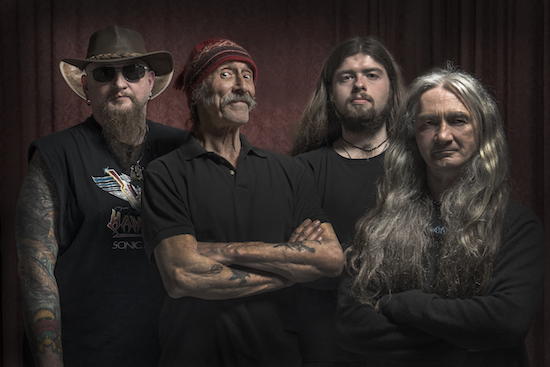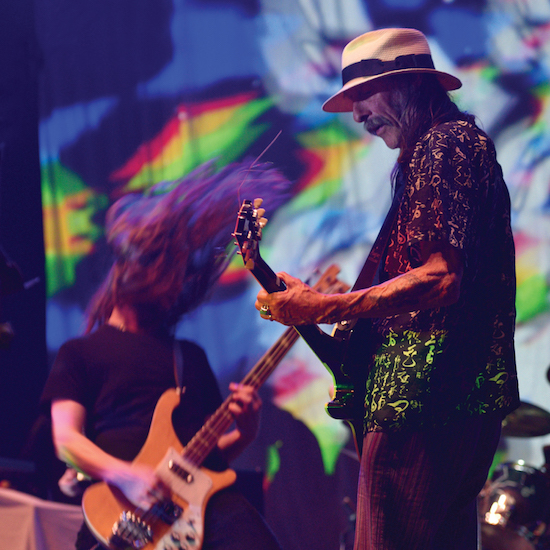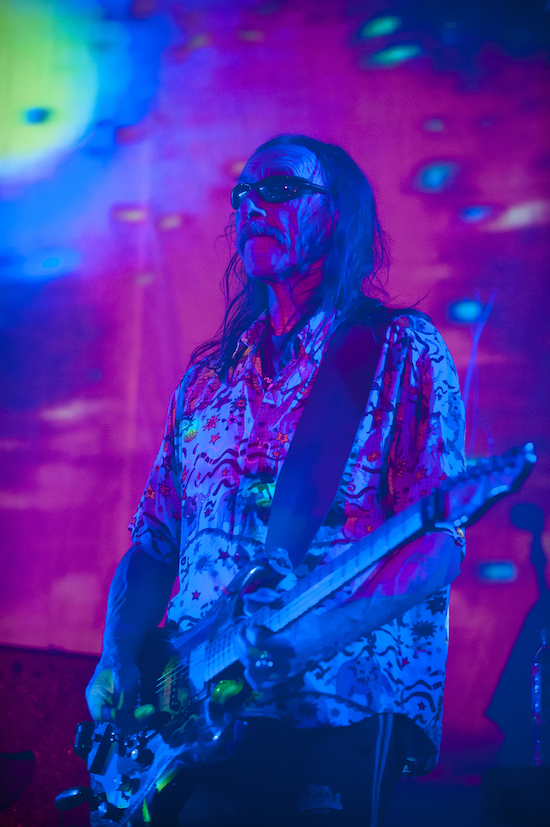Hawkwind are a force of rare and peculiar nature. Over the past 40 years, through innumerable line up changes (band lifer Dave Brock is the sole original member) and the shifting vagaries of musical trends, they’ve remained dedicated to the art of chugging space rock: in the words of Carly Simon, nobody does it better. A driving wall of sound adorned with electronic drones and bleeps, spoken word passages, tales of futuristic derring do and swathes of disorientating white noise, the five albums they released on United Artists – starting with 1971’s X In Search Of Space and ending with 1975’s Warrior At The Edge Of Time – are, rightly, held to represent an essential pantheon of primal cosmic righteousness, as intrinsic a run to adherents of the outer reaches of noisy psychedelia as, say, Black Sabbath to Sabotage is to any self respecting doom obsessive. But the Hawkwind catalogue holds many riches beyond – not least the recent twin concept albums, 2016’s The Machine Stops (based on the EM Forster novella of the same name) and last years Into The Woods.
For the past few decades the band has operated from Brock’s rambling farmhouse studio in Devon – recording and rehearsing three days a week – but Hawkwind are, at heart, a West London band steeped in the early 1970’s counter culture that spawned them. Records like Doremi Fasol Latido and Hall Of The Mountain Grill were imbued with a grimy post war sootiness, Notting Hill and Ladbroke Grove decades off gentrification and still pock marked by bomb sites. ‘The Psychedelic Warlords (Disappear in Smoke)’ speaks of a fusty West London hinterland of damp terraces, Lebanese hash, greasy spoons, strong tea and misty Portobello mornings. And while the Hawkwind catalogue is filled with sci-fi inspired material, they frequently turn a cynically jaundiced eye to the future. Songs like ‘Ejection’, ‘We Took The Wrong Step Years Ago’ and ‘Brainstorm’ pivot on human dread in the face of rampant technological advance, emphasising the fragility of the human form, the battle against cosmic control systems and the fleetingness of existence in the vast void of endless space. As Brock sings on ‘Brainstorm’
"Can’t get no peace
Until I get into motion
Sign my release from
This planet’s erosion
Paranoia police have
Sussed out my potion
You gotta help me or
There’ll be an explosion."
During the 1970s, 80s and 90s Hawkwind were permanent fixtures on the free festival circuit, enthusiastically adopted by a ragtag tribe of bikers, hippies, punks and early ravers, all of whom found solace and wild release in their hypnotic live show. But despite all this, Hawkwind are too often denied their true critical dues as a radical musical life force (if there were any justice they’d be venerated as true pioneers in the same way as Can or Neu! but they always looked like they were having too much fun for that). Those who know, however, really know. And the Hawkwind faithful will assemble at the Roundhouse – a spiritual homeland for the band – on May 6 to watch them blow open the space time continuum once again, leaving a vortex of fried brains and rictus grins in the black Camden night.

TQ caught up with Dave Brock in advance of the show to discuss his memories of the venue, acid crazed nights and the benefits of locking your mobile telephone in an upstairs drawer and leaving it there.
What are your earliest memories of the Roundhouse?
Dave Brock: I used to go busking in London with Pete Judd. He was a harmonica player, I was a guitar player. We played outside the Roundhouse frequently. I distinctly remember doing it when they had The Pretty Things on doing S.F. Sorrow. That was quite a long time ago. It used to be open from three to midnight and we’d go down there every week. Lots of fond memories of the place really: dropping loads of acid and running around, great bands playing. But it was a mess then, in comparison to now. Up on the balcony it used to be all full up with railway sleepers and suchlike – it used to be really dirty. You didn’t have all the markets and tourists so much in those days, Camden was pretty run down really. I suppose now it must be quite expensive to live around there now, but back then it was pretty cheap.
I read Lemmy’s autobiography a few years back. He wrote about how he and Dik Mik had to be pushed on stage at the Roundhouse, stiff as boards due to chemical incapacitation…
DB: Oh god, yeah. I can remember one gig: we’d all dropped acid about two hours before we were due to go on and it was bloody strong acid. One of our roadies came in and said, ‘Right, you’re on now’ and we said, ‘Oh, we can’t possibly go on now. That would be absolutely impossible.’ So he went away and came back half an hour later and said, ‘Now you really do have to go on.’ So off we went and it was a weird old thing when we started playing when we got on stage. The audience all turned into skeletons! [LAUGHS] We had this amazing light show but you’d look down at yourself and find that you’d somehow turned into a massive green and purple blob. It was quite disconcerting.
Hawkwind were at the infamous Greasy Truckers benefit gig, alongside Man. Can you remember that one?
DB: I remember there was a massive power failure in the middle of the whole thing! But I can’t remember much else. We’ve played so many places over the years. We actually played the Roundhouse last year and sold out the place. It was the first time we’d played there since 1977. We had Motorhead supporting us then – that was straight after all the strife so we asked Lemmy if he wanted to come and support us. But last year was the first time we’d played there since then.
And you released it as a live album too, right?
DB: It went really well. It sold out. We did it as a triple album. I haven’t got the faintest clue what they’re going to do with it now, repress it I suppose. Apparently they have to get records printed up in Poland or somewhere like that these days. We had (ex-Motorhead guitarist) Phil Campbell support us last year, funnily enough. That was great because I don’t think that Phil had played there for many years, either. It was one of those magical moments – the last time we did it with Motorhead and this time we did it with Phil – there was a good connection there.
The Hawkwind crowd has always been diverse. Punks, crusties, bikers, ravers, all sorts. Why do you think that is?
DB: It’s because of the free festival connection, really. We used to play them all the time. We’d do a lot of dance stuff and trancey stuff using sequencers – people like all that – and then we’d add the high octane, heavy chord psychedelia on top. You can get away with these things, you know!
You’re doing Desertfest in a couple of weeks with Monster Magnet. I know Dave Wyndorf is one of the biggest Hawkwind fans around.
DB: We’ve played with them a few times, over the years. We did ‘Ejection’ with them at some festival in Finland. They’ve just released a cover of that actually. There’s hope for us yet!
Recent years have seen a significant resurgence for psychedelia of various forms. Have you noticed a significant upswing in interest in Hawkwind?
DB: Things come round, don’t they? Eventually people come round to it and think, ‘Oh, that’s not too bad, is it?’

Your last two records have been concept albums. The Machine Stops was based on the 1909 EM Forster novella of the same name which told of the future and the damaging effects of technology. Why did you choose to focus on that book?
DB: That book was written in 1908 but, really, he was talking about the internet. It’s quite incredible. I read so many science fiction books and some of these ideas come to fruition but then sometimes you’ll watch Star Trek: Next Generation and think, ‘Cor, bloody hell, why can’t we have these things now? Why do we have to wait for another two hundred years until we’re all dead’. But that book, we read it and thought the parallels with what is happening right now were fascinating. In the novel, people just sit in their rooms. They don’t go to the doctor because they don’t have doctors any more, they can get all their prescriptions sent to them. They don’t have to interact with anybody any more. It all seemed spot on. And then the following album – Into The Woods – was really about the ‘above earth and the spirit’ side of nature.
What are your thoughts on the way technology shapes human relations today?
DB: Well, I’m one of the few who still reads books. I think technology can have a very negative effect. I don’t go on the internet much. The only thing I really do is cruise through eBay looking at guitars and pedals [LAUGHS]. I think, ‘Oh, that would be nice if I could have that’ but I never get anything. I love reading and using my imagination. Unfortunately, with all of the games and films that come out, they don’t have much dialogue now – it’s all action. I think that human beings need to use a bit of imagination, rather than anything else.
I find the prospect of a significant mass of people who have lost all ability to sit and read a book or listen to a record in full quite terrifying.
DB: Absolutely. Or to just sit and daydream. Perhaps I’m old fashioned. We always do albums where one song goes into another… and then that song goes into another song [LAUGHS]. We like to take people on a trip. And most bands, when they do an album, that’s exactly what they want, a journey – but now people think, ‘Ooh, I’ll just have this track here and now I’ll listen to a track by so and so’ but, really, an album is a voyage in sound. And the thing with vinyl is you have a nice piece of artwork to look at. You need a magnifying glass on a CD. The writing is so small, you think, ‘What the fuck does that say?’
The Hawkwind artwork was always spectacular. The space log in X In Search Of Space and the way that Space Ritual folded out and then kept folding out. Was it Calvert who drove that side of things?
DB: Calvert was quite an eccentric character, he used to come up with great ideas. He’d write poetry and all sorts. It was a combination of that and Michael Moorcock’s fantasy, he wrote the captains log.
Didn’t Michael Moorcock write a novel about Hawkwind?
DB: That was Mike Butterworth, mainly. Moorcock did a bit. I found it rather silly though. Time of the Hawklords. Some chap in Manchester did a comic of the whole thing. That was much better, I thought. It had wonderful graphics and artwork.
You’ve just had the annual Hawkeaster festival. How was that? I understand you had a couple of Calvert plays on?
DB: We had two. We had the one about Hendrix and the one about being locked inside a box. That was great. It was a really good few days. We did a jam session on Friday night; then we had Paul Zennon, the magician. He can take your watch off without you realising what he’s doing. He was doing fantastic tricks. We had Ginger Wildheart, The Membranes, loads of bands. We change the venue every year, this time it was the Lambeth Theatre in Morecambe. It’s a fantastic old Victorian theatre. It was going to be converted into flats but we helped save it. It was where Sir Lawrence Olivier did The Entertainer by John Osborne. The building has some serious history. They got an arts grant to save it, providing it was used for arts purposes. The view is amazing from the restaurant. A lot of these places get shut down and turned into blocks of flats or pulled down. It’s a shame. There is so much history there. We heard some wonderful stories about Ken Dodd, who used to play there.
Is there any kind of free festival network left?
DB: Pretty much gone down the drain now. The congregation of people has been pretty much stamped out, there are probably a few minor ones going on. They provided the opportunity for young bands to play because nowadays it can be really difficult. A lot of pubs and clubs just book tribute bands, which I’m very much against. I hate tribute bands. With the festivals, you had to play for nothing but then that’s part of life. The Criminal Justice Act put the final nail in the coffin for that scene, really. You could pop up on some common somewhere and set up a small stage – all the local bands would come and play. Nowadays everybody has their mobile phones, you can be traced anywhere! I put my mobile phone in a drawer. I don’t take it with me very often. Our bass player has it out when he stops at the garage to fill up the car, then he has to have it again afterwards to go on Facebook. All these little things, it’s mad [LAUGHS].
Hawkwind are playing with an orchestra at the London Palladium later this year, how are rehearsals coming along?
DB: We’re doing it at the London Palladium. It’s sold out. We’re working with Mike Batt – he’s having to write everything down for the orchestra. They have to read everything that they play. It all has to be arranged which is really quite difficult because we’re a very… unpredictable band [LAUGHS]. Our music doesn’t exactly lend itself to rigid orchestral arrangement. We have to play things regimented, which is quite difficult. We’ve only got one rehearsal with the orchestra in the afternoon and then we do it that night! They just read the music. I’m sure it’ll be alright on the night though.


